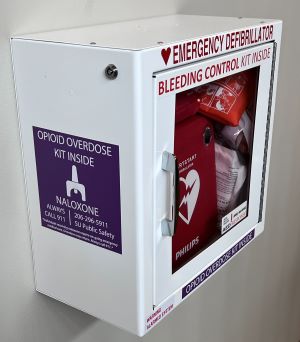Opioid Overdose Prevention Program
Posted: September 20, 2023
 Student & Campus Life is excited to announce a new program aimed at addressing the increasing use of opioids across the country and here in the Seattle community. Prescription opioids, such as oxycodone, hydrocodone, and fentanyl are medications prescribed by doctors to treat moderate to severe pain, but that also have serious risks and side effects, including the risk of dependence, addiction, and accidental death by overdose. According to the CDC, 75% of the 107,000 overdose deaths reported in the U.S. in 2021 involved an opioid medication or heroin.
Student & Campus Life is excited to announce a new program aimed at addressing the increasing use of opioids across the country and here in the Seattle community. Prescription opioids, such as oxycodone, hydrocodone, and fentanyl are medications prescribed by doctors to treat moderate to severe pain, but that also have serious risks and side effects, including the risk of dependence, addiction, and accidental death by overdose. According to the CDC, 75% of the 107,000 overdose deaths reported in the U.S. in 2021 involved an opioid medication or heroin.
As part of our ongoing commitment to the health and safety of our students, faculty, staff, visitors, and local community members, we are introducing the availability of naloxone (brand name Narcan), a medication delivered by nasal spray that can rapidly reverse the effects of an opioid overdose and potentially save lives. Naloxone is now available over the counter and can be purchased at many pharmacies.
Starting immediately, you will notice that AED (Automated External Defibrillator) cabinets have been affixed with distinctive purple stickers across campus. In addition to a defibrillator and a “stop the bleed” kit, these cabinets now also contain opioid overdose kits with naloxone. We have 36 AED cabinets in buildings across campus; as of today, 24 of these cabinets have already been stocked with opioid overdose kits. We expect to receive additional kits to stock more cabinets in the coming weeks. Additionally, Public Safety officers have additional units of naloxone available in the event of an emergency.
If you observe someone on campus who appears to be experiencing an opioid overdose, please first call Public Safety at 206-296-5911 or call 911 and stay with the person until help arrives. Public Safety officers have been trained on how to properly administer naloxone and how to take steps to prevent possible secondary exposure. University community members are not expected to administer naloxone; however, if you choose to do so while awaiting help from Public Safety and emergency medical personnel, please follow the guidelines for administering the medication available on the American Medical Association website. Written instructions are also available inside the opioid overdose kits.
Increasing awareness about the risks associated with opioid use and the availability of naloxone is part of our campus-wide effort to prevent and respond to overdoses. Wellness & Health Promotion will be launching an awareness campaign and website during this academic year to educate our community about opioids and the naloxone program.
This program is an important addition to our campus safety and wellness initiatives and reinforces our commitment to caring for our university community and our neighbors. We encourage you to familiarize yourself with the locations of the AED cabinets with purple stickers in the buildings you frequent on campus and to be aware of the signs of opioid overdose.
If you have any questions or would like more information about the program, please contact Dr. James Willette, Associate Provost & Dean of Students at deanofstudents@seattleu.edu or Chris Fiorello, Director of Wellness & Health Promotion at wellness@seattleu.edu.
